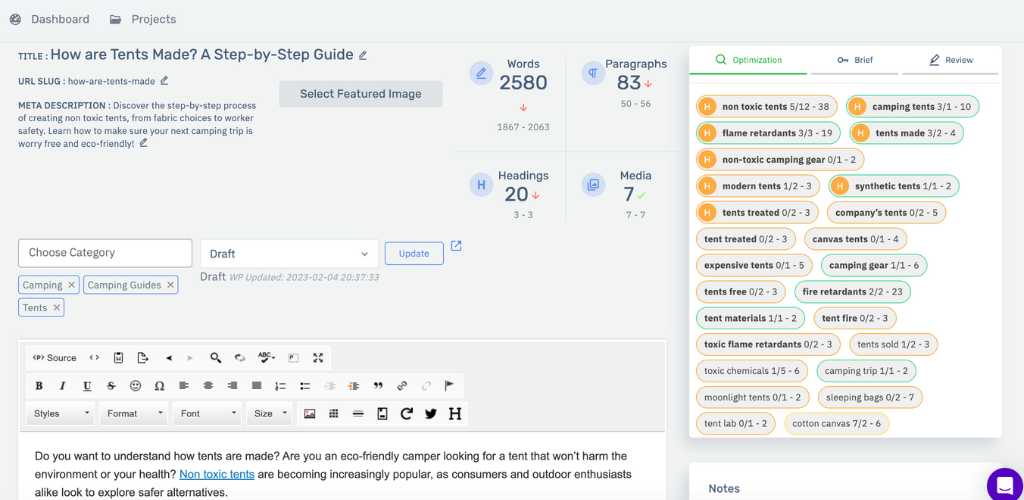
Creating a successful blog post can be a challenging tasks. This is where the Ai writer Content At Scale comes in to save you hours of time and help create the perfect 3,000+ word blog post in a matter of minutes.
Julia McCoy, a top content marketer, shows us how to write SEO-friendly article in less than an hour using Content At Scale.
In the video, she uses the C.R.A.F.T. framework to refine and optimize the content. C.R.A.F.T involves cutting the fluff, reviewing, editing, optimizing with keywords, adding images and media, fact-checking, and building trust through personal stories.
By using Content At Scale AI and following the C.R.A.F.T. framework, you can create a successful 3000+ word blog post that ranks well on Google in a fraction of the time it would normally take you.
If you haven’t tried Content At Scale, Click here to sign up for Content At Scale and get 20% more post credits when you sign up.
Click here to read an example that I created with Content At Scale.
Key Takeaways:
- Using AI tools, such as Content at Scale, can save time while writing a perfect blog post.
- The C.R.A.F.T. framework involves cutting the fluff, reviewing, editing and optimizing the content, adding images and media, fact-checking, and trust building through personal stories.
- Trust building through personal stories is a powerful way to connect with readers.

Step-by-Step Process:
- Use AI tools such as Content at Scale to create a 3000+ word blog post on a topic that attracts leads and sales.
- Use the C.R.A.F.T. framework to refine and optimize the content.
- Cut the fluff ruthlessly, and get to the point.
- Review and edit the content, optimizing it with keywords, images, and media.
- Fact-check your blog post to ensure the accuracy of the information presented.
- Trust build by adding personal stories to connect with your readers.
Resources:
- Content at Scale: AI-powered tool for content creation.
- C.R.A.F.T. framework: A framework for content creation that involves cutting the fluff, reviewing and editing the content, adding images and media, fact-checking, and trust building through personal stories.
FAQ:
Q: What is the C.R.A.F.T. framework?
A: The C.R.A.F.T. framework is an acronym that stands for Collaborative, Resourceful, Agile, Focused, and Transparent. The process is used as a set of guidelines for successful project management and team collaboration.When applied to content creation, the framework involves cutting the fluff, reviewing and editing the content, adding images and media, fact-checking, and trust building through personal stories.
Q: What is Content at Scale?
A: Content at Scale is a software that automates content creation, publishing, and management. It uses AI and natural language processing to create unique, engaging, and SEO-optimized content. Content at Scale is designed to help businesses produce high-quality content at a large scale, quickly and efficiently.
The software can generate content for various formats, such as articles, social media posts, videos, and more. It integrates with multiple platforms, including WordPress, HubSpot, and social media channels, to streamline content distribution.
The content creation process is customizable, allowing users to adjust the tone, style, and length of the content to fit their needs.
Q: Can AI completely replace human writers?
A: No, AI can assist in writing high-quality content, but human writers are still necessary for creating unique and creative content.
- Creativity: AI lacks the innate creativity that human writers possess. Human writers have the ability to think outside the box and come up with original ideas that AI cannot replicate.
- Emotion: Human writers can convey emotions in their writing that AI cannot match. AI-generated content can be formulaic and lack the emotional depth that humans can convey.
- Intuition: Human writers have a better sense of intuition and can write with a certain level of intuition that AI cannot replicate.
- Context: AI can only generate content based on the data it has been trained on. Human writers can write based on their personal experiences and understandings of the world, providing a richer context in their writing.
- Personality: Each writer has a unique personality that comes through in their writing, which cannot be replicated by AI.
- Critical thinking: Human writers are skilled in critical thinking and can analyze complex topics and express them in a way that is understandable to the reader.
- Ethics: AI cannot make ethical decisions, such as whether or not to publish certain content or use certain sources, whereas human writers can make these decisions based on their own ethical standards.
- Judgment: Human writers have the ability to make judgments about what content is appropriate for a particular audience or publication, something that AI cannot do on its own.
- Style: Writing style is an important aspect of writing that AI cannot replicate. Each writer has a unique style, and AI-generated content can lack the nuances of human style.
- Learning and growth: Human writers continue to learn and grow throughout their careers, improving their writing skills and developing their own unique voice, whereas AI is limited by its programming and data sets.
Q: Can I use AI to generate ideas for my blog posts?
A: Yes, AI algorithms can help you come up with new and creative blog post ideas. These tools can also analyze previous blog posts, suggest new topics based on your writing style and help you find trending topics and relevant keywords.
Q: How important is keyword research for writing blog posts?
A: Keyword research is essential for writing blog posts that rank well in search engines and drive traffic to your website.
Q: How can I build trust with my readers?
A: You can build trust with your readers by telling your personal story, being transparent about your brand, and providing value to your audience.
Video Host Bio:
The creator of the video is Julia McCoy, an entrepreneur, author, and content marketer. She is the CEO of Express Writers, a leading content creation agency. She is also the author of two bestselling books on content marketing, and she has been named a top content marketer by Forbes.
YouTube channel: Express Writers